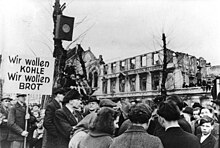JCS 1067
JCS 1067 refers to a directive issued by the United States' Joint Chiefs of Staff on occupation policy to the Combined Chiefs of Staff (CCS) in Germany . It was rejected by the latter despite multiple revisions. Finally, the sixth version, JCS 1067/6, came into effect in April 1945. It only applied to the US armed forces. It replaced the Combined Directive For The Military Government in Germany Prior To Defeat Or Surrender , or CCS 551 for short, which was in force before the German surrender . JCS 1067 laid down the basic lines of US occupation policy for the first time after Germany's surrender. Its provisions remained in effect until Directive JCS 1779/1 came into force in July 1947.
content

The addressee of the directive was the Commander-in-Chief of the US armed forces as the military governor of the US zone of occupation , initially Dwight D. Eisenhower , from October 1945 Joseph T. McNarney , from March 1947 Lucius D. Clay .
The directive named in 52 paragraphs the political, economic and military background, goals and duties of the Commander in Chief of the US troops with regard to his responsibility for the administration and the military occupation and as a member of the Allied Control Council . She formulated clear boundaries for his relationship with the Germans:
“Germany will not be occupied for the purpose of its liberation, but as a defeated enemy state. Their goal is not the suppression, but the occupation of Germany in order to achieve certain important Allied purposes. In conducting the staffing and administration, you must be fair but firm and aloof. You will strictly prevent fraternization with German officials and the population. "

There were also strict regulations for economic life. The economy should be decentralized and controlled with the help of German authorities. An economic recovery of Germany beyond what was absolutely necessary to supply the occupation troops and the life of the population was not desired. The standard of living in the US zone could not exceed that of the neighboring states. American grants for supplies should be made to the extent that hunger, disease outbreaks and civil unrest do not pose a threat to the occupying power.
Directive JCS 1067 ordered that the military governors could not take any action except for the benefit of overriding purposes that “the
- (a) could lead to the economic reconstruction of Germany
or
- (b) are suitable for maintaining or strengthening the German economy. "
Lewis Williams Douglas said, “This thing was put together by economic policy idiots. There is no point in banning the most highly educated workers in Europe from producing as much as they can for a continent that has a hopeless shortage of everything. "
In fact, General Eisenhower, as well as his successors and their departments, very soon applied the directive only in a weakened form, because they came to the impression that a strict application would be against the interests of the USA. On September 6, 1946, the US Secretary of State James F. Byrnes gave the speech of hope in Stuttgart, in which he announced a fundamental change in occupation policy in favor of the people - if necessary without the Soviet side. Directive JCS 1779/1, which replaced Directive 1067/6 on July 15, 1947, contained the specifications for this new occupation policy.
literature
- Rolf Steininger : German history. Presentation and documents in four volumes. Volume 1: 1945–1947 (= Fischer Taschenbuch 15580), Frankfurt am Main 1983–2002, p. 47 ff.
- Karl-Ulrich Gelberg: From the end of the war to the end of the Goppel era (1945–1978). In: Max Spindler u. a .: Handbook of Bavarian History. Volume IV / 1, Munich 2003, pp. 635-956.
- Reprinted in: Karl-Ulrich Gelberg (arr.): Sources on the political history of Bavaria in the post-war period. Volume I: 1944-1957. 1st edition Munich 2002, pp. 25–37.
See also
Web links
![]() Original English text of instruction JCS 1067 in WikiSource, full text
Original English text of instruction JCS 1067 in WikiSource, full text
- Directive to the Commander-in-Chief of the US Occupation Forces in Germany (JCS 1067), German-language excerpt . Ed .: German History in Documents and Pictures, German Historical Institute, Washington, DC .: (PDF; 40 kB)
Individual evidence
- ↑ http://germanhistorydocs.ghi-dc.org/sub_document.cfm?document_id=2297&language=german
- ↑ "supplies necessary to prevent starvation or widespread disease or such civil unrest as would endanger the occupying forces"
- ↑ Post-war semester: Studies in the war and post-war period , p. 85
- ^ Directive to the United States Military Governor for Germany (Clay) . Contains instructions to Clay regarding the application of the JCS 1779/1 directive. Office of the Historian, Bureau of Public Affairs, Department of State
- ^ Robert A. Selig: America's Long Road to the Federal Republic of Germany (West) . In: German Life , June / July 1998 (PDF; 131 kB)